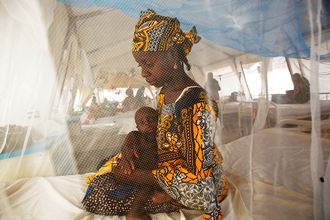Nigeria faces a grave child malnutrition crisis, ranking second globally in the number of stunted children, according to UNICEF.
By Gift Ovuede
Over two million Nigerian children suffer from severe acute malnutrition (SAM), with only two out of every ten receiving adequate treatment.
Sokoto State, home to over five million people, has become the epicentre of this crisis.
The rising cost of living has exacerbated the situation, leaving families struggling to feed their children. With food prices skyrocketing, many parents can no longer afford to provide proper nutrition for their children, fueling the malnutrition epidemic.
A father of six from Tudun Wada, Sokoto, Mallam Hassan speaks to the daily struggles his family faces. “Proper nutrition is no longer a priority,” he said. “We eat whatever we can find just to survive. We hope things will get better soon.”
Similarly, a mother of nine from Gidan Asada, Saratu Mohammed echoed these concerns. “I can’t remember the last time we had a good meal. I used to provide two meals a day, but now we can barely manage that,” she shared. “There are days we go without a proper meal, and it’s clearly affecting my children’s growth.”
The situation in Sokoto is dire, with a 2023 UNICEF report revealing that 300,000 children in the state are malnourished.
The report, titled “2023 Sokoto, Katsina, and Zamfara SMART Survey and Integrated Food Security Phase Classification (IPC) Acute Malnutrition Analysis,” highlights the depth of the problem.
Nutrition specialist Jamilu Gwadabawa attributes the surge in malnutrition to poor feeding practices caused by economic hardship.
“A child dying of malnutrition is a preventable tragedy,” he said, urging the government and donor agencies to step in and provide immediate support.
The data is alarming. According to the Alive & Thrive initiative, 30.3% of children under five in Sokoto are underweight, 31.9% are stunted, 8.4% are wasted, and 15.8% are born with low birth weight. Experts estimate that five out of every ten children in the state suffer from malnutrition, and they attribute this worsening trend to the escalating cost of food commodities.
In response to the growing crisis, the Sokoto State government has partnered with UNICEF to offer relief to affected families.
During a recent meeting with UNICEF’s Country Representative, Christien Muduate, Governor Ahmed Aliyu pledged to ensure that funds for nutrition programs are readily available.
This collaboration is expected to help curb malnutrition and provide critical support to vulnerable families across the state.
The state’s partnership with UNICEF is part of broader efforts to address food insecurity and improve the health outcomes of children in Sokoto.
However, as the economic challenges persist, experts warn that more urgent interventions are needed to tackle malnutrition and its long-term impact on the state’s children.


